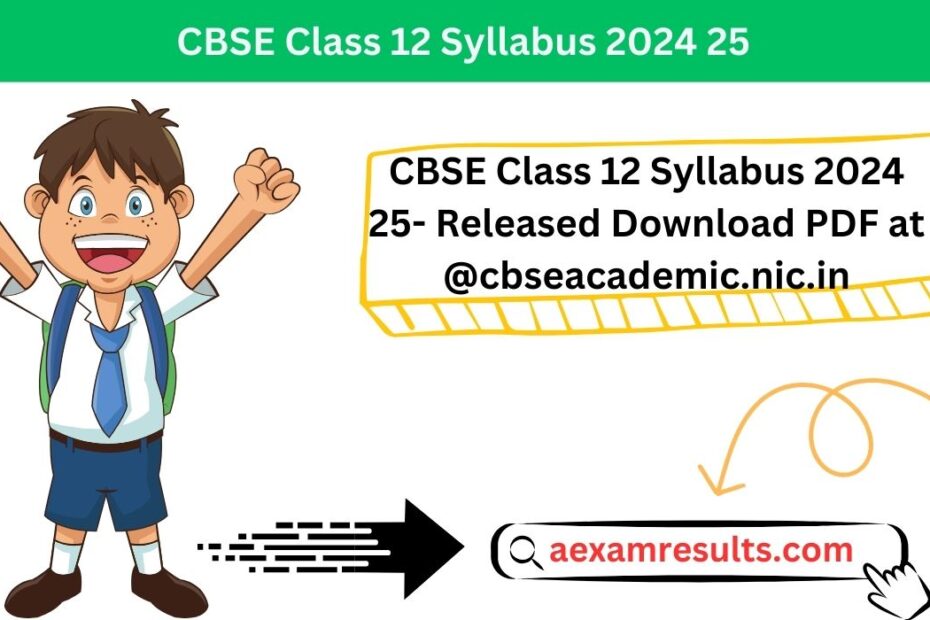The CBSE Class 12 Syllabus 2024-25 plays a vital role in shaping students’ knowledge and preparing them for various board exams and entrance tests. This year’s syllabus, designed by the Central Board of Secondary Education (CBSE), covers a broad range of topics across Science, Commerce, and Humanities streams. With new additions and modifications, students need to understand the course structure, marking scheme, and subject-wise details. In this comprehensive guide, we provide an in-depth look at the CBSE Class 12 syllabus, helping students plan their studies effectively.
CBSE Class 12 Syllabus 2024 25

Class 12 is crucial for students as it directly impacts their academic and career opportunities. The CBSE syllabus is structured to cover the fundamental topics needed for higher education and entrance exams. Following the syllabus helps students focus on relevant topics, practice consistently, and score well on the board exams.
Science Stream Syllabus
1. Physics
The Physics syllabus focuses on various concepts in mechanics, thermodynamics, electricity, and modern physics, which are fundamental for engineering and medical entrance exams.
Key Units
- Electrostatics: Charges, Coulomb’s law, electric field and potential, capacitance.
- Magnetism and Magnetic Effects of Current: Magnetic field, Ampere’s law, electromagnetic induction.
- Optics: Reflection, refraction, lenses, and optical instruments.
- Modern Physics: Photoelectric effect, Bohr’s atomic model, nuclear physics.
Practical Topics
- Experiment on finding resistance using a meter bridge.
- Determination of focal length of a concave mirror and convex lens.
2. Chemistry
Chemistry includes Physical, Organic, and Inorganic Chemistry. This subject focuses on chemical reactions, structures, and properties of materials.
Key Units
- Solutions and Colligative Properties: Types of solutions, Raoult’s law, boiling and freezing points.
- Electrochemistry: Electrolysis, cell potentials, batteries, and fuel cells.
- Organic Compounds Containing Nitrogen: Amines, diazonium salts, and their reactions.
- Coordination Compounds: Bonding, properties, and applications.
Practical Topics
- Volumetric analysis for acid-base titration.
- Preparation of organic compounds and salt analysis.
3. Biology
Biology focuses on life sciences, covering genetics, ecology, physiology, and human health.
Key Units
- Genetics and Evolution: Mendelian inheritance, molecular basis of inheritance, evolutionary theory.
- Human Physiology: Digestive, respiratory, circulatory, and nervous systems.
- Ecology: Ecosystems, biodiversity, and environmental conservation.
- Biotechnology: Genetic engineering, applications, and ethical issues.
Practical Topics
- Microscopic examination of cells.
- Study of plant and animal tissues.
Commerce Stream Syllabus
1. Accountancy
Accountancy focuses on financial statements, partnerships, and company accounts.
Key Units
- Accounting for Partnership Firms: Profit sharing, reconstitution, dissolution.
- Company Accounts: Issue and redemption of shares and debentures.
- Financial Statements Analysis: Ratio analysis, cash flow statements.
Practical Topics
- Preparing financial statements from incomplete data.
- Project work based on a company’s balance sheet analysis.
2. Business Studies
Business Studies gives insights into management principles, business operations, and entrepreneurship.
Key Units
- Principles and Functions of Management: Planning, organizing, staffing, directing, and controlling.
- Business Finance and Marketing: Financial planning, stock market, and product life cycle.
- Consumer Protection: Consumer rights, laws, and redressal mechanisms.
Practical Topics
- Case studies on managerial principles.
- Projects related to consumer awareness campaigns.
3. Economics
Economics covers Micro and Macroeconomics, focusing on economic principles, theories, and Indian economy insights.
Key Units
- Microeconomics: Consumer behavior, market structure, production, and cost.
- Macroeconomics: National income, monetary policy, government budget.
- Indian Economic Development: Sectoral developments, poverty, human capital formation.
Practical Topics
- Data collection and analysis on economic indicators.
- Study projects on issues like poverty and unemployment.
Humanities Stream Syllabus
1. History
History delves into Indian and World history, covering political, social, and cultural evolution.
Key Units
- Themes in Indian History: Ancient to modern history, focusing on key eras and events.
- World History: Revolutions, wars, and socio-political changes in Europe, America, and Asia.
Practical Topics
- Historical project work based on case studies.
- Analysis of significant historical events and their impact.
2. Political Science
Political Science explores political theories, governance, and international relations.
Key Units
- Indian Politics after Independence: Key events, movements, and government policies.
- Comparative Politics: Government forms and functioning across different countries.
- International Relations: UNO, global challenges, diplomacy, and treaties.
Practical Topics
- Case studies on political issues.
- Project work on international organizations and global conflicts.
3. Geography
Geography includes physical, political, and human geography, covering resource distribution and environmental studies.
Key Units
- Human Geography: Population, migration, urbanization, and settlement.
- India’s Geographical Aspects: Resources, industries, and regional development.
- Practical Topics
- Map work related to Indian geography.
- Project on climate change and its effects on ecosystems.
Preparation Tips for CBSE Class 12 Exams
- Understand the Syllabus: Thoroughly go through the syllabus and mark important units.
- Use NCERT Books: Focus on NCERT textbooks as they cover CBSE’s syllabus comprehensively.
- Create a Study Schedule: Allocate more time to complex subjects and practice previous year question papers.
- Regular Revisions: Regularly review each subject to reinforce knowledge and retain information.
- Take Mock Tests: Mock exams help improve time management and familiarize students with the exam pattern.
For More Relvted Update aexamresults.com
